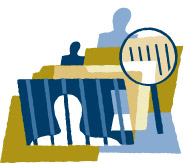When justice goes awry
The name James Driskell was recently added to a list of individuals whose wrongful convictions are fated to haunt Canada's criminal justice system for decades to come. Last week, Justice Minister Irwin Cotler formally quashed the 1991 conviction that resulted in Driskell spending a dozen years in jail for the murder of his friend Perry Harder.

Tzigane
It is precisely this sort of miscarriage of justice that led a group of McGill law students to launch the Innocence Project, an initiative that has been officially underway since February. The first of its kind in Quebec, the project is focused on proving the innocence of prisoners who have been wrongly convicted of serious crimes.
The individuals behind the Innocence Project have begun work with a deliberate absence of fanfare and a serious and methodological set of procedures by which the files of prisoners will be examined. In a faculty with more than its share of prima donnas, the law students behind this remarkable initiative remain entirely self-effacing and free of cant.
Robert Israel is a shy and gentle-spoken individual who last winter drew together a small group of like-minded students in first-year criminal law. Concerned by the wrongful convictions of individuals like David Milgaard and Guy Paul Morin, the group began to research the work done by chapters of the Innocence Project in the United States and at Osgoode Hall law school in Toronto. Now they are prepared to begin work in Quebec. Asked to comment on the group's motivations, Israel is succinct.
"There's a bit of idealism with all of us, but a desire to tie it to something practical. It's a question of justice but for me it's especially a question of liberty. Someone's freedom is the greatest value that they have, and you only realize this when it's taken away."
Aiding the law students in their endeavour are two Montreal criminal lawyers, and professor Patrick Healy. This guidance is intended to ensure that the Innocence Project will have a degree of institutional continuity, as the nature of the justice system means that any cases the group takes up will likely span several years, and will require assiduous and on-going management. This fact has not been lost on either the students or the law faculty.
"Dean [Nicholas] Kasirer is very pro student-initiatives but he made it clear that we have to ensure that this doesn't fail," says Gord Cruess, another of the group's members. "Once you start someone's file, there's a moral obligation to see it through."
For a file to be undertaken by the Innocence Project, a prisoner must have exhausted all avenues of appeal. Should the group's research reveal that a wrongful conviction may have occurred, the two ways by which a case can be reconsidered are either through the intervention of the Justice Minister or through an attorney general's reference to a court of appeal. According to the website of the McGill Innocence Project, the work of the group's various chapters has resulted in the exoneration of over 140 convicted individuals in the United States and Canada.
For now, the new McGill chapter is now in the course of consolidating its channels of communication. According to Christine Mainville, who is another member, the Innocence Project is presently working to "make those people aware who need to be aware", and will begin to accept cases in the coming months.
As the case of James Driskell last week revealed, the criminal justice system is hardly foolproof. The conviction of innocents remains a distressing reality, one that is unlikely to change in the future. Until society can create a perfect justice system, people like those in the Innocence Project remain the last hope for the wrongfully convicted.
"The unfortunate part of it is that it is possible for an innocent to be convicted, even with people of good will on all sides," says Healy. "When that happens, it's a tragic mistake. If students can do something to stop it, my full support is behind them."
More Information about the McGill Innocence Project is available at www.mcgill.ca/innocence.
